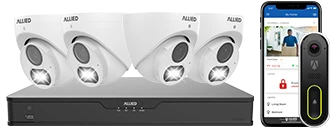Introduction to Home Security Systems
Home security systems are designed to safeguard residential properties from intrusions, burglaries, and other potential threats. Over the past few decades, advancements in technology have significantly enhanced the effectiveness and accessibility of these systems, making them an essential component for many homeowners.
The primary purpose of a home security system is to provide protection and peace of mind. By integrating various devices such as alarms, cameras, sensors, and control panels, these systems can detect unauthorized entry, deter criminal activity, and notify homeowners and authorities of potential security breaches.
According to the Federal Bureau of Investigation (FBI), burglaries accounted for over 16% of the estimated number of property crimes in 2019, emphasizing the importance of adequate security measures. A comprehensive home security system can serve as a crucial deterrent, as studies have shown that homes without security systems are significantly more likely to be targeted by burglars.
- Intrusion Detection: This is the core functionality of a home security system. It includes door and window sensors, motion detectors, and alarm systems that activate when a potential intrusion is detected.
- Surveillance: Security cameras offer real-time monitoring and recording. Modern systems provide features such as high-definition video, night vision, and cloud storage.
- Environmental Monitoring: Beyond intrusion, some systems also monitor environmental hazards like smoke, fire, carbon monoxide, and water leaks.
- Remote Access: Many systems now include mobile apps that allow homeowners to monitor and control their security devices remotely.
- Professional Monitoring: Professional monitoring services alert authorities in case of an emergency, ensuring a prompt response.
In this chapter, the foundational elements and fundamental purpose of home security systems have been outlined. As we proceed, we will delve deeper into the types of systems available, their features, benefits, and the considerations for homeowners when selecting an appropriate security solution.
Types of Security Systems Available for Homeowners
Homeowners have a range of security systems to choose from, each offering unique features and benefits. The main types of security systems available include monitored systems, unmonitored systems, wireless systems, and hybrid systems.
Monitored Security Systems
Monitored security systems are professionally overseen by security companies, providing a high level of protection. When sensors are triggered, the system sends an alert to the monitoring center, which then contacts the homeowner and emergency services if necessary.
Key Benefits:
- 24/7 surveillance, ensuring continuous protection.
- Immediate response from professionals in case of a security breach.
- Can include additional services like fire and carbon monoxide monitoring.
However, these systems generally require a monthly fee for monitoring services, and there may be installation costs involved.
Unmonitored Security Systems
Unmonitored systems, also known as self-monitored systems, rely on the homeowner to respond to alerts. When sensors detect a breach, the system activates alarms and sends notifications to the homeowner’s smartphone or other devices.
Key Benefits:
- No recurring fees for monitoring services.
- Allows homeowners to control and monitor their own security.
- Often easier to install and configure than monitored systems.
While cost-effective, these systems depend on the homeowner to take timely action, which may delay response times in emergencies.
Wireless Security Systems
Wireless security systems utilize radio frequency signals to connect various components, such as sensors, cameras, and control panels. These systems are versatile and can be easily installed without extensive wiring.
Key Benefits:
- Quick and easy installation.
- Flexibility to expand the system as needed.
- Reduced risk of tampering with wires or disabling the system.
However, wireless systems can be susceptible to signal interference and may require regular battery changes for sensors and other devices.
Hybrid Security Systems
Hybrid systems combine elements of wired and wireless security systems, offering the reliability of wired connections with the flexibility of wireless components. These systems are often used in larger properties or for those seeking a robust security solution.
Key Benefits:
- Enhanced reliability with hard-wired components for critical functions.
- Flexibility to integrate wireless devices where cabling is impractical.
- Scalable to accommodate future security needs.
Hybrid systems may involve more complex installation and higher costs than fully wireless systems, but they provide an excellent balance of dependability and versatility.
Key Features of Modern Home Security Systems
One of the most critical aspects of selecting an effective home security system is understanding the key features that modern systems offer. These features can significantly enhance the security of a household, providing peace of mind and a robust defense against potential threats.
1. Smart Home Integration: Many modern security systems offer integration with smart home devices. This means that homeowners can control their security solutions using smart assistants like Amazon Alexa, Google Assistant, or Apple HomeKit. Integration can include controlling lights, locks, and even thermostats alongside the security system.
2. Remote Monitoring and Control: Remote monitoring allows homeowners to view live feeds from their security cameras and receive alerts on their smartphones or computers. This capability ensures that even when away from home, homeowners can keep an eye on their property and respond to any alerts promptly.
3. Motion Detection: Motion sensors are a staple in modern security systems. These sensors detect unusual movement within the home or on the property. Advanced motion detectors can differentiate between humans, pets, and inanimate objects to reduce false alarms.
- Passive Infrared (PIR) Sensors: Detect body heat and movement.
- Microwave Sensors: Use microwave pulses to detect movement.
- Dual-Technology Sensors: Combine PIR and Microwave sensors for higher accuracy.
4. High-Definition Video Surveillance: Modern security cameras provide high-definition video, which helps in clearly identifying faces and other details in footage. Some systems offer features such as night vision and wide-angle lenses. The footage can often be stored locally on a DVR or in the cloud for easy access and review.
5. Environmental Sensors: Beyond just security, many systems incorporate sensors to monitor environmental conditions. These can include smoke detectors, carbon monoxide detectors, and water leak sensors. These additions help protect against hazards like fires, gas leaks, and flooding.
6. Wireless Technology: Many contemporary systems rely on wireless technology, making installation more flexible and less invasive. Wireless systems can be easier to expand, relocating or adding devices without the need for complex wiring.
7. User-Friendly Interfaces: Modern security systems often come with intuitive interfaces, both on control panels and mobile apps. These interfaces are designed to be easy to use, allowing homeowners to arm and disarm systems, view footage, and receive alerts with minimal learning curve.
8. Professional Monitoring Services: Some security systems offer optional professional monitoring. This service involves a dedicated team that monitors the system around the clock and can contact authorities on the homeowner’s behalf if an alarm triggers, adding an extra layer of security.
9. Battery Backup: Many systems feature battery backup options to ensure they remain operational during power outages. This is crucial for maintaining security continuity during emergencies.
10. Customization and Scalability: Modern systems are highly customizable, allowing homeowners to choose specific components and features that fit their needs. Furthermore, these systems can often be scaled up to add more features or integrate additional devices as needed.
By understanding and utilizing these key features, homeowners can significantly enhance the effectiveness of their home security systems. The advancement in technology has made it possible for security systems to be more reliable, comprehensive, and user-friendly than ever before.
Benefits of Implementing Home Security Systems
Implementing home security systems offers numerous benefits that can significantly enhance both the safety and convenience of residential living. The primary advantages encompass various aspects such as crime deterrence, rapid emergency response, peace of mind, and potential financial savings.
Crime Deterrence: One of the most significant benefits of having a home security system is its ability to deter crime. Studies have shown that homes without security systems are up to three times more likely to be broken into than those with such systems in place. The presence of alarms, cameras, and signs from security companies can make potential intruders think twice before attempting to invade a property.
Emergency Response: Modern home security systems often come equipped with features that enable quick responses to emergencies. Many systems include smoke detectors, carbon monoxide detectors, and flood sensors that can alert homeowners and emergency services immediately.
This rapid response capability can prevent disasters from escalating and potentially save lives.
Peace of Mind: Knowing that one’s home is protected provides a significant level of comfort. Whether homeowners are at work, on vacation, or asleep, the assurance that security measures are in place helps to alleviate concerns about potential threats. The ability to monitor the home remotely through mobile applications also contributes to this sense of security.
Financial Savings: Investing in a home security system can lead to financial benefits as well. Many insurance companies offer discounts on home insurance premiums for properties equipped with security systems. These discounts can offset the cost of the system over time. Additionally, preventing burglaries and property damage through effective security measures can save homeowners from the financial losses associated with such events.
The following table summarizes key benefits of home security systems:
| Benefit | Description |
|---|---|
| Crime Deterrence | Reduces the likelihood of burglary by up to three times compared to homes without security systems. |
| Emergency Response | Enables quick alerts and responses to emergencies such as fires, gas leaks, and floods. |
| Peace of Mind | Provides continuous monitoring and remote accessibility, contributing to a sense of safety. |
| Financial Savings | Potential insurance premium discounts and prevention of property loss help offset system costs. |
In summary, while the upfront cost of a home security system can be a consideration, the comprehensive benefits they provide make them a valuable investment for homeowners seeking to protect their properties and loved ones.
Challenges and Considerations in Selecting Home Security Systems
When selecting a home security system, homeowners face several challenges and considerations that can significantly impact the effectiveness and convenience of their security measures. Understanding these challenges is crucial in making an informed decision.
1. Cost and Budgeting
Cost is a major consideration for many homeowners. Security systems can vary widely in price, not only in terms of initial installation but also in ongoing maintenance and monitoring fees. It’s important to balance cost considerations with the level of security provided.
- Initial costs: Purchasing the equipment and installation fees.
- Ongoing costs: Monthly fees for professional monitoring and potential maintenance costs.
2. Integration with Existing Systems
Many homeowners already have some form of smart home technology. Ensuring that a new security system integrates seamlessly with existing devices, such as smart locks, lights, and cameras, can be a technical challenge.
3. Scalability
Security needs can evolve over time. A homeowner may start with a basic system and later wish to add more devices or features. Therefore, it’s important to choose a system that is easily scalable.
4. Privacy Concerns
With increasing concerns over data privacy, homeowners must consider how security systems handle personal information. Choosing systems with robust privacy policies and data encryption can help mitigate these concerns.
5. User Friendliness
Complex systems with steep learning curves can be a deterrent. Homeowners should select systems that are intuitive and user-friendly. Ease of use is particularly important in emergency situations.
6. Reliability and Maintenance
The reliability of sensors, cameras, and alarms is paramount. Systems need regular updates and maintenance to ensure they function correctly over time. Consideration of manufacturer support and service provisions is essential.
7. Professional Monitoring vs. Self-Monitoring
Homeowners must decide between professional monitoring services, which offer 24/7 surveillance by security experts, and self-monitoring options, which rely on the homeowner to respond to alerts.
- Professional monitoring: Generally involves higher monthly fees but provides peace of mind.
- Self-monitoring: More economical but requires the homeowner to be vigilant and responsive to alerts.
8. Legal and Insurance Implications
Some insurance companies offer discounts for homes with security systems, while certain municipalities may have regulations regarding alarm systems. Homeowners should be informed about these potential legal and financial implications.
Comparison of Professional Monitoring vs. Self-Monitoring
| Aspect | Professional Monitoring | Self-Monitoring |
|---|---|---|
| Cost | Higher ongoing fees | Lower costs, possibly only equipment fees |
| Response Time | Usually faster, as trained professionals manage it | Dependent on homeowner’s availability |
| Peace of Mind | Higher, due to 24/7 surveillance | Lower, as it relies on personal responsiveness |
| Control | Less direct control over the system | Full control, including direct management of responses |
Ultimately, the choice of a home security system should be guided by a thorough understanding of these challenges and considerations. Homeowners must weigh their specific needs, preferences, and circumstances to select the most suitable security solution.
Future Trends in Home Security Systems
The home security industry is continually evolving, driven by advancements in technology and the growing demand for more sophisticated and reliable protection measures. Several emerging trends are poised to shape the future of home security systems, providing homeowners with enhanced safety, convenience, and peace of mind.
One significant trend is the integration of artificial intelligence (AI) and machine learning into home security systems. These technologies enable systems to analyze data more intelligently and offer predictive analytics, which can foresee security threats before they materialize. For example, AI can differentiate between regular household movements and suspicious activities, reducing the occurrence of false alarms.
Another trend is the growing adoption of smart home integration. Modern security systems are increasingly compatible with various smart home devices, such as thermostats, lights, and door locks. This integration allows homeowners to create a more interconnected and automated home environment. For instance, a security system can trigger lights to turn on when it detects motion, deterring potential intruders.
The proliferation of the Internet of Things (IoT) is also influencing the future of home security. IoT-enabled devices can communicate with each other and the home security system, providing real-time updates and allowing for more responsive security measures. Homeowners can receive instant alerts on their smartphones if any suspicious activity is detected, regardless of their location.
Biometric technology is another area seeing increased application in home security systems. Technologies like fingerprint scanners, facial recognition, and voice authentication offer more secure and convenient methods for verifying the identity of individuals accessing the home. Biometric systems reduce the risk of unauthorized access since biometric data is difficult to replicate or steal.
The future of home security also includes an emphasis on cybersecurity. As more devices become interconnected, the risk of cyber-attacks on home security systems grows. Manufacturers are prioritizing the development of robust cybersecurity measures to protect against data breaches and ensure the safe operation of their systems.
In addition to technological improvements, the affordability and accessibility of advanced security systems are expected to increase. The cost of sensors, cameras, and other components is decreasing, making state-of-the-art security features available to a broader range of consumers. Additionally, more companies are offering flexible financing options and subscription-based services to make security solutions more attainable.
Lastly, the rise of environmentally friendly security solutions is becoming more prominent. Solar-powered security cameras and energy-efficient devices provide eco-conscious homeowners with sustainable options that reduce energy consumption while maintaining efficient performance.
In summary, the future of home security systems is marked by technological advancements that enhance functionality and user experience. The ongoing integration of AI, IoT, biometrics, and cybersecurity measures, along with increased affordability and eco-friendly options, points to a more secure and interconnected home environment in the coming years.












